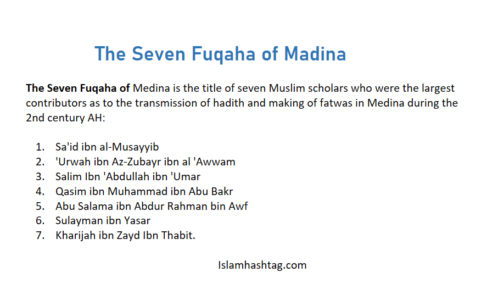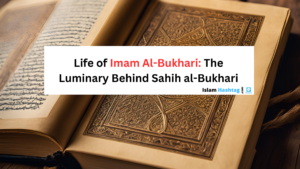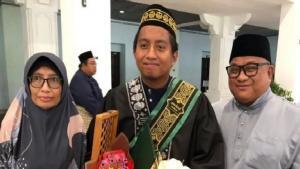The Seven Fuqaha of Madina
Contents
hide
The Seven Fuqaha of Medina is the title of seven Muslim scholars who were the largest contributors as to the transmission of hadith and making of fatwas in Medina during the 2nd century AH:[1]
- Sa’id ibn al-Musayyib
- ‘Urwah ibn Az-Zubayr ibn al ‘Awwam
- Salim Ibn ‘Abdullah ibn ‘Umar
- Qasim ibn Muhammad ibn Abu Bakr
- Abu Salama ibn Abdur Rahman bin Awf
- Sulayman ibn Yasar
- Kharijah ibn Zayd Ibn Thabit.

Seven Fuqaha of Madina
Some scholars include Abu Bakr ibn Abd ur-Rahman ibn al-Harith, and Ubaydullah ibn Abdillah ibn Utbah ibn Mas’ud instead
1.Sa’id ibn al-Musayyib(637-715)
- Sa‘id was born in 642, during the caliphate of Umar ibn al-Khattab(radi allahu anhu ) and had the opportunity to meet most of the sahaba including Uthman (radi allahu anhu )and Ali ibn Abi Talib (radi allahu anhu ).
- Sa‘id ibn al-Musayyib married the daughter of Abu Hurayrah (radi allahu anhu ) in order to be closer to him and to learn better the Traditions that he narrated.
- Imam Malik ibn Anas and Imam Shafi‘i took as unquestionably authentic the ahadith that Sa‘id ibn al-Mussayyib narrated from ‘Umar or the Prophet as authentic, without mentioning from whom he received them. This means that, in the view of these Imams, Sa‘id ibn al-Musayyib was of the same rank as the Companions in knowledge and narration of the alhadith.
2.’Urwah ibn Az-Zubayr ibn al ‘Awwam (643-713)
- He was the son of Zubayr ibn al-Awwam and Asmā’ bint Abu Bakr. He was also the brother of Abd Allah ibn al-Zubayr and the nephew of Aisha bint Abu Bakr.
- He devoted himself to the study of fiqh and hadith and had the greatest knowledge of hadiths narrated from Aishah.
- Urwah wrote many books, but destroyed them the day of the Battle of al-Harrah. He later had a feeling of regret, saying “I would rather have them in my possession than my family and property twice over.” At the same time, he quashed any fears that they might become sources of authority alongside the Qur’an.
- He is also known to have written one of the first writings in the area of the biography of Muhammad, known as the Tract of Seerah. This is not extant either but is known through Ibn Ishaq.
- His narrations are transmitted by: Ibn Shihab al-Zuhri
3. Salim Ibn ‘Abdullah ibn ‘Umar (650-724)
- Salim ibn ‘Abd-‘Allâh ibn ‘Umar ibn al-Khattâb was a well known narrator of hadith many of which he related first hand from either his father, Abd-Allah ibn Umar (died 693), or his grandfather, the caliph Umar ibn al-Khattab (r. 634-644). His paternal aunt was Hafsa bint Umar, one of wives of Rasul Allah (pbuh)
- Salim is mentioned in Imam Malik’s Muwatta regarding the Islamic practice of rada’a, where a woman becomes unmarriageable kin (mahram) by means of suckling.
- He, in Sahih al-Bukhari alone, relates three Hadiths.
4. Qasim ibn Muhammad ibn Abu Bakr (631-658)
- Al-Qāsim’s father was Muhammad, son of the first Rashidun Caliph, Abu Bakr. His paternal aunt was Aisha, one of the wives of Rasul Allah (pbuh)
- He learned hadith and fiqh from his aunt and from Ibn Abbas. He was a transmitter of hadith and criticised the use of a hadith if its text was put before the Quran and established Sunnah
- Abdu r-Rahman ibn Abi Zannad said that his father mentioned, “I did not see anyone who knew the Sunnah better than al-Qasim.”
- He was highly influential in disseminating early traditions of hadith, fiqh (jurisprudence) and tafsir (exegesis) of the Qur’an.
5. Abu Salama ibn Abd al-Rahman (Died- 712)
- He was the son of Abdur Rahman Ibn Awf
- He was a Tabi’ Tabi’een
- Some of his teachers were Abu Hurairah, ibn Abbas, ibn Umar, Abdur Rahman Ibn Awf, Uthman ibn Affaan, Talha ibn Ubaidullah, Ubada bin As-Samit
6. Sulayman ibn Yasar (654-721)
- He was a client of Maymuna bint al-Harith radi allahu anha, the wife of the Prophet, may Allah bless him and grant him peace. It is said that she gave him a kitaba contract and stipulated an amount of money he must pay for his freedom. It is reported that he asked permission to visit ‘A’isha. He said, “She recognised my voice. She said, ‘Is it Sulayman?’ Then she asked, ‘Have you paid what she stipulated for you?’ I said, ‘Yes, nearly. There is only a small amount outstanding.’ She said, ‘Come in. You are still owned as long as you still owe anything.’”
- He transmitted from Zayd ibn Thabit, ‘Abdullah ibn ‘Umar, Abu Hurayra, and the wives of the Prophet, Maymuna, A’isha, and Umm Salama. Sulayman had fine understanding.
- His knowledge and understanding of fiqh were increased by his study of people’s affairs and knowledge of their states.
- He was the overseer of the Market of Madina when ‘Umar ibn ‘Abdu’l-‘Aziz ra was its governor.
7. Kharija ibn Zayd ibn Thabit(650-719)
- Because of his great knowledge of the shares of inheritance, he used to distribute people’s inheritances according to the Book of Allah Almighty.
- Mus’ab ibn ‘Abdullah said, “Kharija and Talha ibn ‘Abdu’r-Rahman gave fatwa in their time. People accepted their statements and they distributed people’s inheritance – houses, palm-trees and property – and they wrote out documents for people.”
- Kharija was one of the devout worshippers of Madina. Worship moved him at the end of his life to withdraw and be alone, which is why not much of his fiqh and knowledge spread.
Discover more from Islam Hashtag
Subscribe to get the latest posts sent to your email.





